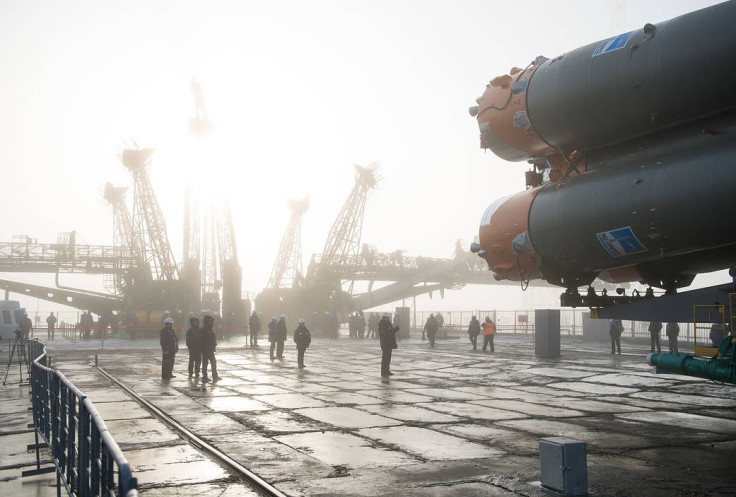International Space Station Expedition 56: Soyuz Launch Live Stream By NASA

The International Space Station (ISS), orbiting about 400 kilometers above Earth’s surface, is about to see another change of crew. Three astronauts — two from the United States and one from Russia — who make up Expedition 56 to ISS will start their journey Wednesday aboard a Soyuz spacecraft, and arrive at their destination Friday.
Flight engineers Ricky Arnold and Drew Feustel from NASA will accompany Soyuz commander Oleg Artemyev in the Soyuz MS-08 rocket, which is scheduled to launch at 1:44 p.m. EDT Wednesday from its usual launch pad at the Baikonur Cosmodrome, Kazakhstan. After 34 orbits around the planet and 50 hours later, they will arrive at the orbiting space laboratory, docking with the Poisk module at 3:41 p.m. EDT Friday.
All three astronauts have been to ISS before, and have considerable experience conducting space walks among them. They will join members of Expedition 56 on the space station, which include the commander Anton Shkaplerov from Roscosmos, and flight engineers Scott Tingle of NASA and Norishige Kanai of Japan Aerospace Exploration Agency, who have been in space since Dec. 17.
The Russian-built Soyuz MS-08 that will fly Wednesday arrived at its launch pad Monday morning, and has been undergoing servicing since. The launch itself, as well as the docking with ISS and opening of the hatch, will all be broadcast live by NASA. The launch coverage will start at 12:30 p.m. EDT Wednesday, and can be watched on the space agency’s website, using this link. The docking live stream would start at 3 p.m. EDT Friday.
The astronauts headed to ISS, where they will spend the next five months, expressed their anticipation on their Twitter accounts (Artemyev’s is in Russian).
Rocket headed to the pad and upright! @OlegMKS @astro_ricky and I are ready to roll! 2 days to liftoff @Space_Station pic.twitter.com/aXjF8Ja6m4
— A.J. (Drew) Feustel (@Astro_Feustel) March 19, 2018
L-24 hours pic.twitter.com/G2YUGrHZ5e
— Ricky Arnold (@astro_ricky) March 20, 2018
1 день до старта! 🚀
— Oleg Artemyev (@OlegMKS) March 20, 2018
Сегодня Госкомиссия утвердила нас с Эндрю и Ричардом в состав основного экипажа корабля «Союз МС-08», а потом мы отвечали на многочисленные вопросы журналистов о полете. Здесь можно посмотреть запись пресс-конференции - https://t.co/Ynvkj72cp5. pic.twitter.com/LFRYtniqI0
Some of the hundreds of experiments that would be carried out by the astronauts in the microgravity environment of the space laboratory are in the fields of biology, biotechnology, physical science and Earth science. Research conducted aboard ISS is integral to the future of space exploration, because it allows us to understand how things behave in the harsh conditions of space. Knowing that is critical to any long-term space missions humans may plan, such as setting up a base on the moon or sending a crewed expedition to Mars.
China is also working on setting up its own space station, called Tiangong (Chinese for “heavenly palace”). It is expected to be complete by the middle of the next decade.
© Copyright IBTimes 2024. All rights reserved.











